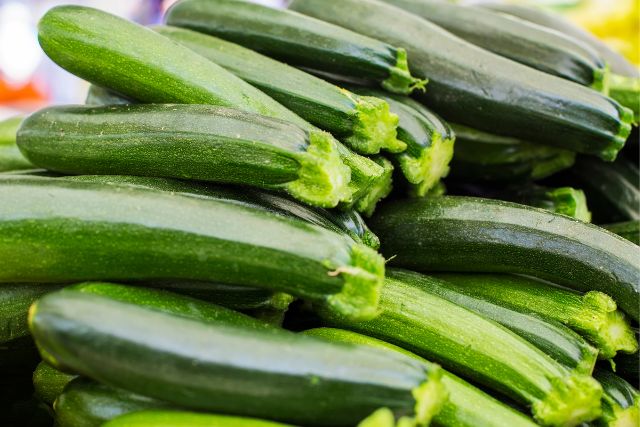Recent Posts
-

- Diabetes-Friendly Nutrition: Smart... 08.12.2024
-

- Nutrition for Chronic... 08.12.2024
-

- Anti-Inflammatory Diet: Food... 08.12.2024
-

- Low-Sodium and Heart-Healthy:... 08.12.2024
-

- Plant-Based Diets for... 08.12.2024
Organic Zucchini Wonderland: Cultivating and Cooking with Nature's Versatile Squash

Organic gardens all around the globe rely heavily on zucchini because of its mild taste and ability to adapt to different seasons. This adaptable squash provides a wide range of culinary options, from the bright yellow blooms to the abundant crop it produces all year. Let us explore the enthralling world of organic zucchini, from its cultivation to the mouthwatering recipes that may be made with it.
There is a kind of summer squash known as zucchini, a member of the genus Cucurbita pepo. The elongated form of this creature, which is often cylindrical or slightly tapered at the ends, is one of its defining characteristics. Its skin is typically smooth and dark green. However, certain types may have yellow or striped variations. The mild, somewhat sweet taste of zucchini, along with its soft texture, makes it a very adaptable item that can be used in a wide variety of cuisines all over the globe.
Salads, stir-fries, casseroles, bread, muffins, and cakes are just some of the meals that benefit from their usage. It is also often used in savory and sweet recipes. Additionally, zucchini is well-known for its high water content and nutritional value. It is low in calories and an excellent source of vitamins, minerals, and dietary fiber. All of these qualities make it a popular vegetable.
Growing Organic Zucchini in the Garden
Zucchini grown organically thrive on soil rich in nutrients, has good drainage, and receives enough sunshine. You should start by purchasing organic zucchini seeds or seedlings from trusted suppliers. The seeds should be planted immediately in the garden, or seedlings could be started a few weeks before your region has its final frost.
It is important to ensure that each zucchini seed or seedling is planted about two to three feet apart for sufficient development. Ensure that the soil is continually wet without becoming waterlogged, and think about mulching the area surrounding the plants to prevent weeds from growing and keep the soil moist.
The importance of watering zucchini plants consistently must be considered, particularly during periods of drought. To avoid fungal illnesses, you should always avoid watering the plants from above. Instead, you should water the plants at the base in the morning so the leaves may dry over the day.
Achieving and Sustaining Plant Health
Fertilizing organic zucchini plants with organic compost or aged manure occasionally is beneficial, even though organic zucchini plants need very little upkeep. Furthermore, watching for common pests such as aphids, squash bugs, and cucumber beetles is essential, which can swiftly destroy plants. It is possible to combat pests organically by using techniques such as hand-picking, companion planting with herbs that repel insects, or natural pesticides such as neem oil.
To effectively encourage continual production, regular harvesting is essential. The optimal time to harvest zucchini is while it is still young and fragile, often between 6 and 8 inches in length. Frequent harvesting assures a consistent supply of fresh zucchini and prevents the fruits from growing large and rough. This is possible because of the frequent harvesting.
Integrating Zucchini into the Cooking Process
Organic zucchini is ready to be used in various culinary preparations by the time it is harvested. An infinite number of possibilities are available, ranging from sautéing and grilling to baking and spiralizing. Some of the most delectable ways to savor the squash that nature has to offer are as follows:
Zucchini Noodles (Zoodles):
An alternative to pasta that is low in carbohydrates and healthful may be made by using a spiralizer to generate long, thin strands of zucchini, which can then be sautéed with garlic and olive oil.
Stuffed Zucchini Boats:
To prepare the zucchinis, cut them in half lengthwise, remove the seeds, and then stuff them with a flavorful combination of quinoa, veggies, and herbs. Bake till soft for a vegetarian supper that will fulfill your hunger.
Zucchini Fritters:
To make a batter, grate the zucchini, combine it with the eggs, flour, and spices, and mix well. To create a tasty and crispy snack or side dish, fry spoonfuls of the mixture until they reach a golden brown color.
Zucchini Bread:
A moist and aromatic loaf that is ideal for breakfast or snacking may be made by combining shredded zucchini with cinnamon, nutmeg, and walnuts if you combine these ingredients.
Not only is organic zucchini simple to cultivate, but it is also both adaptable and nutrient-dense, making it an excellent addition to any kitchen. If you cultivate your zucchini using organic ways and experiment with different cooking techniques, you can enjoy the delightful qualities of zucchini in all of its splendor. In all honesty, organic zucchini is a marvel of nature's wealth, whether consumed straight from the garden or included in the dishes you like the most.
Disclaimer: The information provided in this article is for general information purposes only. All information in this article is sourced from other websites, and we do not represent any rights regarding the contents and information on the site. All rights belong to their original owner.





